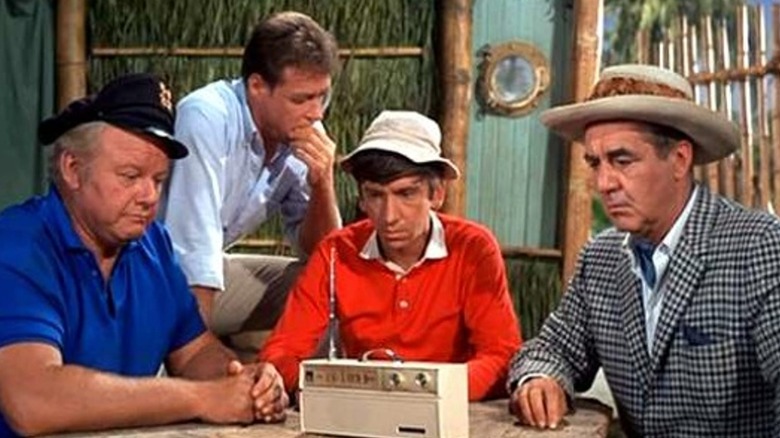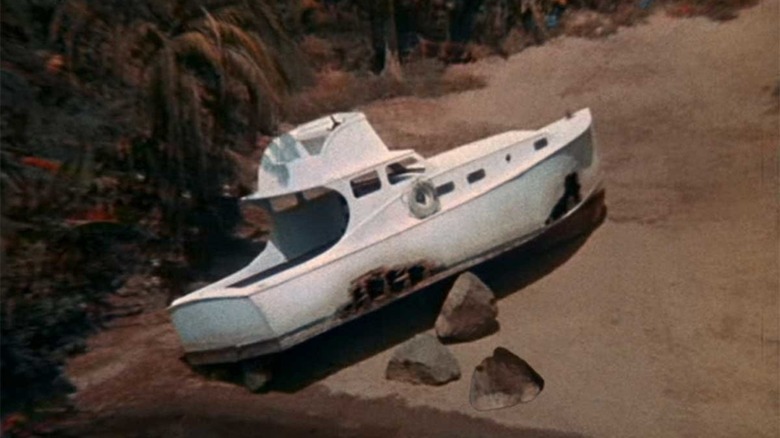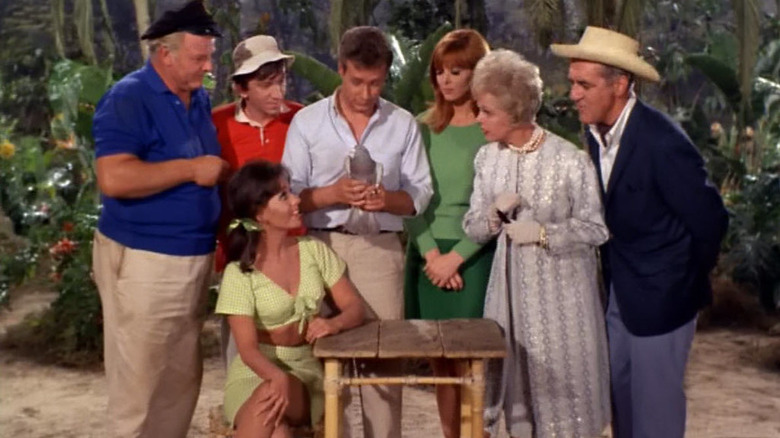CBS Wanted To Remove The Titular Island From Gilligan's Island
When Sherwood Schwartz first came up with the idea for his 1964 sitcom "Gilligan's Island," he was less concerned with its uncharted tropical island setting as he was with cramming people with disparate backgrounds into a situation where they couldn't leave each other. He initially liked the idea of making a workplace drama, but, he felt, that wasn't isolated enough. He eventually figured that if a varied cast of characters was stranded, alone, in a remote location, then comedy and story would naturally follow.
Schwartz developed his concept into "Gilligan's Island," wherein a tour boat captain (Alan Hale), his first officer (Bob Denver), a millionaire (Jim Backus), his wife (Natalie Schafer), a professional actress (Tina Louise), a farm girl (Dawn Wells), and a scientist (Russell Johnson) take a Hawai'ian sea tour, only to be pulled off course by bad weather and stranded on a lost island in the Pacific. The series would eventually last for 98 episodes over three seasons, and, thanks to an eternal syndication deal, become one of the most recognizable shows in TV history. Most people over a certain age have seen multiple episodes of "Gilligan's Island" without even trying.
In Sherwood Schwartz's 2011 book "Gilligan's Island: From Creation to Syndication," the show creator revealed that CBS wasn't too keen on "Gilligan's Island" from the start. Indeed, James T. Aubrey, the president of CBS Television in the 1960s specifically hated the premise of the show and pitched an alternate idea instead. In his book, Schwartz describes a truly bizarre board meeting with Aubrey and two of the highest honchos at CBS, William S. Paley and Frank Stanton, and how Aubrey threw a series of paper airplanes at him to get his point across. What if, Aubrey counter-pitched, there was a boat ... but no island?
Gilligan's travels
Schwartz recalled Aubrey's arrogance more than anything. Although Aubrey was in the room with his superior officers, he still felt permitted to idly throw paper airplanes. Schwartz figured that Aubrey was entitled to a certain amount of arrogance, however, as the man had, with its 1962-63 season, lifted CBS to the top of the ratings pile; 14 of the top 15 shows at the time were overseen by Aubrey. The only non-CBS show in the top 15 was "Bonanza," an NBC show.
Aubrey was throwing paper airplanes as a way to show his displeasure with Schwartz's pitch for "Gilligan's Island." It seems he had a better idea for the show: a show without castaways. Aubrey wanted a travelogue show, not a desert island show. Schwartz wrote:
"Another paper airplane took off. Was it simple eccentricity, or was Mr. Aubrey trying to tell me something? Although this was Mr. Paley and Dr. Stanton's first exposure to the concept of 'Gilligan's Island,' Mr. Aubrey and I had discussed the show many times. And we had a major disagreement. Mr. Aubrey loved the idea of Gilligan, the Skipper, and their little charter boat, but he wanted me to call the series 'Gilligan's Travels.'"
What would "Gilligan's Travels" be about? By Schwartz's recollection:
"In Mr. Aubrey's view of the series, the shipwreck, the Castaways, and the deserted island were simply the first episode. In succeeding episodes of the show, Gilligan, the Skipper, and the rebuilt S.S. Minnow would take other passengers on other trips to other places."
A tour of various exotic locales, each one with a new set of characters? It certainly sounds more "primetime" than several lonely figures trapped in a single location. Perhaps a fine idea for a series, but it wasn't what Schwartz pitched.
Aubrey's specific objections
Schwartz and Aubrey, it seems, had been bickering for quite a long time over the above point. Aubrey wanted "Gilligan's Travels" to be exotic and adventurous. Schwartz wanted a character-based sitcom. Aubrey felt that the desert island concept would need to be explained week after week, tiring out viewers and discouraging newcomers. Schwartz wrote:
"Mr. Aubrey had explained his objection to my version in previous meetings. Several times. In his opinion, my concept of the show would need an enormous amount of explanation each week, expository scenes to explain why this group of people was marooned on the island. Exposition is the most deadly obstacle to entertainment, whether it's a comedy show or a dramatic show."
Luckily, Schwartz co-wrote one of the best TV theme songs in history to cover that very point, using a catchy sea shanty to explain the exact premise of the show and who all the characters were. "The Ballad of Gilligan's Island" is both efficient and an earworm. It's perfect. It seems that the descriptive theme song was a result of Aubrey's doubts. Schwartz continued:
"Each time Mr. Aubrey and I argued this point, I assured him that a theme song at the beginning of the show would obviate that problem. There would be no need for exposition because the opening song would tell the story in an entertaining way. In 1963, however, few TV themes had ever been used for this purpose."
It also helped that Aubrey liked the characters of Gilligan and the Skipper, two somewhat bumbling characters who had a lot of sailing expertise and an interesting job. Schwartz loved that he was able to fight for the premise he liked, and got what he asked for.


